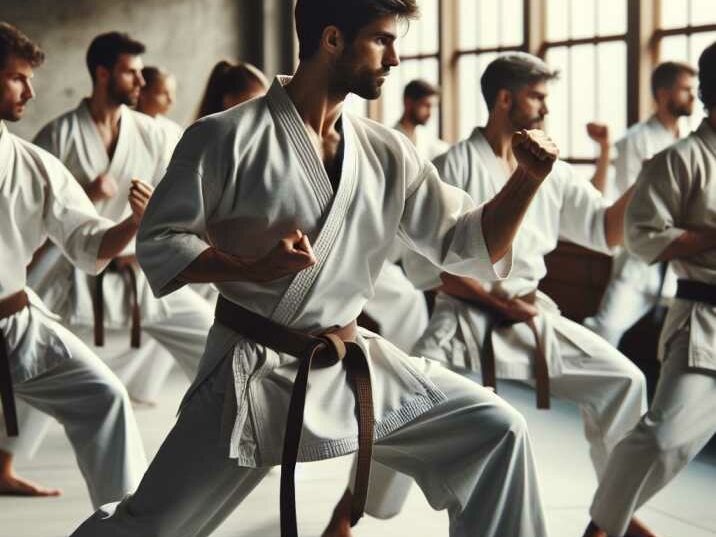Introduction:
Table of Contents
Karate, a traditional Japanese martial art, has captured the imagination of many across the globe. It’s not just about physical strength but also mental discipline and focus. One common question that arises among aspiring martial artists is, “How long does it take to become proficient in Karate?” In this comprehensive guide, we will explore the timeline to proficient in Karate, essential factors that influence progress, and tips to accelerate your journey in mastering this ancient art.

Understanding the Journey:
Karate, like any other skill, requires dedication, perseverance, and consistent practice to reach proficiency in Karate. The time it takes to become proficient in Karate varies from person to person and depends on various factors, including age, physical fitness, previous experience in martial arts, frequency of training, and the level of commitment.
Factors Influencing the Timeline:
Age:
Age plays a significant role in the journey to proficiency in Karate. Younger individuals often have more flexibility and adaptability, which can make it easier for them to learn Karate at a faster pace. Their bodies are more receptive to the physical demands of training, and they may grasp techniques more quickly than older practitioners. However, it’s essential to note that regardless of age, with consistent practice and dedication, individuals of all ages can progress and excel in Karate.
Physical Fitness:
Physical fitness is a fundamental aspect of mastering Karate. Being in good physical shape can expedite the learning process in several ways. Firstly, it enhances endurance, allowing practitioners to sustain longer training sessions and perform techniques with greater precision. Secondly, improved strength and flexibility contribute to better execution of techniques and movements, leading to quicker progress. Moreover, enhanced coordination enables practitioners to execute complex techniques with fluidity and control, ultimately accelerating their journey to proficiency in Karate.
Previous Experience:
Previous experience in martial arts can significantly influence the timeline to make proficient in Karate. Individuals with prior martial arts experience may already possess a foundation of basic techniques, principles, and concepts that are transferrable to Karate. Their familiarity with fundamental movements and terminology can expedite the learning process as they adapt to the specific nuances of Karate. Additionally, experienced martial artists often exhibit greater discipline, focus, and understanding of martial arts principles, which can facilitate quicker mastery of Karate techniques.
Frequency of Training:
Consistent practice is a cornerstone of progress in Karate. The frequency of training sessions directly impacts the rate at which practitioners develop proficiency. Regular training allows for better retention of techniques and muscle memory development, essential elements for mastering Karate. Practitioners who train frequently, incorporating regular practice sessions into their routine, have more opportunities to reinforce skills, refine techniques, and overcome challenges. Conversely, irregular or sporadic training can hinder progress and prolong the timeline to Proficient in Karate.
Level of Commitment:
Dedication and determination are indispensable factors in the journey to mastering Karate. The level of commitment exhibited by practitioners significantly influences their progress and success in the art. Setting realistic goals, staying motivated, and persevering through challenges are essential aspects of maintaining commitment. Practitioners who approach their training with dedication, consistency, and a positive mindset are more likely to achieve milestones and advance in their Karate journey efficiently. Conversely, lack of commitment, wavering motivation, or unrealistic expectations can impede progress and prolong the timeline to Proficient in Karate.
Timeline to Proficient in Karate:
While there’s no fixed timeline for mastering Karate, beginners typically progress through various belt levels, each requiring a certain level of proficiency. On average, it may take three to five years of dedicated practice to achieve a black belt, which is often considered a significant milestone in Karate.

Tips for Accelerating Progress:
- Set Clear Goals: Define what you want to achieve in your Karate journey and work towards it systematically.
- Stay Consistent: Regular practice, even in small increments, yields better results than sporadic training sessions.
- Seek Guidance: Utilize the expertise of experienced instructors who can provide personalized feedback and guidance.
- Cross-Train: Supplement your Karate training with exercises that improve flexibility, strength, and cardiovascular fitness.
- Practice Mindfulness: Focus on each technique mindfully, paying attention to proper form and execution.
- Stay Patient: Progress in Karate is gradual. Embrace the journey and celebrate small victories along the way.
Table of Information Proficient in Karate:
| Belt Level | Approximate Time to Achieve |
|---|---|
| White | 6-12 months |
| Yellow | 6-12 months |
| Orange | 6-12 months |
| Green | 12-18 months |
| Blue | 12-18 months |
| Purple | 12-18 months |
| Brown | 18-24 months |
| Black (1st Dan) | 3-5 years |
Conclusion:
In conclusion, How long does it take to become proficient in Karate? Mastering Karate is a journey that requires dedication, patience, and perseverance. While the timeline to proficiency may vary for each individual, consistent practice and commitment are key to success. By understanding the factors that influence progress and following the tips provided, you can accelerate your journey toward becoming proficient in this ancient martial art.
FAQs:
- Q: Can anyone learn Karate? A: Yes, Karate is suitable for people of all ages and fitness levels.
- Q: Is Karate only about fighting? A: No, Karate emphasizes discipline, self-control, and respect, in addition to self-defense techniques.
- Q: How often should I train to become proficient in Karate? A: Regular training sessions, at least two to three times a week, are recommended for steady progress.
- Q: Can I practice Karate at home? A: While practicing at a dojo (training facility) is ideal, you can supplement your training with solo practice at home.
- Q: What equipment do I need to start learning Karate? A: Initially, comfortable workout clothes and bare feet are sufficient. As you progress, you may require a Karate uniform (gi) and protective gear for sparring.


